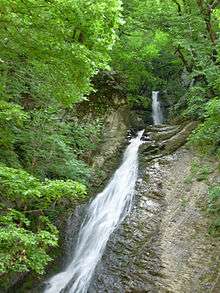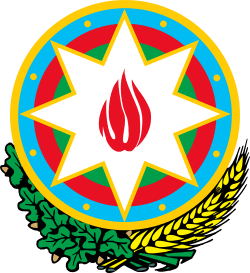Qabala District
| Qəbələ Lezgian: Кьвепеле райун | |
|---|---|
| Rayon | |
| Azerbaijani: Qəbələ rayonu | |
.svg.png) Map of Azerbaijan showing Qabala Rayon | |
| Country |
|
| Capital | Qabala |
| Area | |
| • Total | 1,550 km2 (600 sq mi) |
| Population (2011)[1] | |
| • Total | 95,600 |
| • Density | 62/km2 (160/sq mi) |
| Postal code | 3600 |
| Telephone code | (+994) 24[2] |


Qabala (Azerbaijani: Qəbələ rayonu, Lezgian: Кьвепеле райун) is a rayon of Azerbaijan. Its administrative center is the historic town of Qəbələ, which in ancient times was known as the capital of Caucasian Albania.
Gabala Radar Station is in the rayon and was rented by Russia from Azerbaijan.
History
Qabala bears the name of the ancient Qabala, a city which was the capital of the ancient state of Caucasian Albania. The ruins of the old city are located 20 kilometers to southwest of the present center of the district. The remnants of the large buildings, city gates, tower walls and patters of material culture prove that Gabala was one of the most prominent cities at that time.
Ancient Gabala was created as a city in the late 4th-early 3rd century B.C. and survived up to the mid 18th century A.C. A great many of changes occurred in the life of the city through the period of existence. Due to different historical events the city was damaged more than once.
Though the Roman troops attacked Albania in the 60s B.C they were not able to occupy Gabala. Quring the Sassani period, Qabala was a large trade and handicraft center. The situation remained the same in the times of the Arabian caliphate. Though Qabala experienced decline during the Mongolian invasion in the 13th century, it was restored later. Qabala lost its positions in the mid 18th century and the population gradually left the place.
The small feudal state Qutqashen Sultanate was established on the territory of Qabala in the mid 18th century. It was later included into the Shaki Khanate and was ruled by the Shaki naibs appointed by the khans of Shaki.
Following the downfall of the Shaki Khanate, Qutqashen sultanate was included into the Shaki province. The Qutqashen district was created in 1930. The district was renamed back to Qabala in March 1991, after fall of Soviet Union.
Climate
The geographical position of region influences to the density of river net, richness of land-plant cover of region, upland relief and formation of complex climate condition in the vertical material fit. The damp- subtropical sea climate has been refereed in the territory of the region 25 million years ago. Tumultuous rains, hot weather conditions caused to development of the thick evergreen forest cover. There existed climate condition for multifoliolate evergreen and pouring leaves in an arid period of a year-in summer like climate condition of Mediterranean shores million years ago. The last continental boulder-period happened in our planet 10-12 thousand years ago the high and average upland territory covered with mountain glacier, then in accordance with climate warming the glaciers have melted and diminished and has approached to the modern boundaries. Geographical position of Gabala according to the equator, total sum of sun radiation(general and direct), difference of relief and surface cover, characters of weather mass entering to the territory plays a great role formation of modern climate of Gabala. All shown climate forming factors influence the amount of temperature and rainfall, its distribution in a different degree in the territory of a region. The weather and climate conditions of Gabala investigate in meto station of the city and acting in the Nic settlement for a while in 1936.
The many-month average January temperature in the territory of Gabala changes from 00 to 14 0 and July temperature changes according from + 24 0 to 2 0. Average annual temperature totals in the south + 10 0 - + 12 0 and in the north 00 - - 2 0.
Due to opinion of academician, B.A. Budaghov, the hottest territory of the region observes in the direction of Gushlar-Kurd-Bayramkohka villages and the maximum temperature totals 410-420 herein. The minimum temperature of the region is Bazarduzu peak (4466m) and fall of temperature observes here nearly 50 0. The distribution of the rainfall changes in the direction from north to south. The least fall of annual rainfall in the south of Hajalli and Malikli plains is 350-400 mm and the most rainfall in the north part is 1500-200 meter. During the researches it was determined that the yearly rainfall in the region in May-June is 25-30%.
Ethnic composition
The rayon has a population of 93,770 people, 13,175 of which live in the regional town center Qabala and 80,595 reside in the villages. The density is estimated at 60.49 people per square kilometer. An average living age is 70 years. 73,235 residents of Qabala rayon are Azerbaijanis, 4,640 are Udi, 209 are Turks and 37 are of other nationalities.[1]
Culture
There are 16 culture houses, 31 clubs, a History culture preserve, 69 libraries, an art school, a Picture Gallery, a culture and a recreation Park, H. Aliyev Museum, Historical Ethnography Museum, Martyrs Museum and memorial house-museum of I.B. Gutgashinli which are branches of Historical Ethnography Museum according to Gabala region Culture and Tourism Sector.
Popular theatre named after C. Mammadguluzada, “Chinar” instrumental ensemble acts in Region culture house, “Zop-Zopu” folclor dance ensemble acts in Bum settlement culture house, and “Changi” Udin folklore dance ensemble acts in Nij settlement culture house.
There are 93 historical-cultural immovable monuments under Gabala region taken to the state protection according to the order #132 dated on 02.08.2001 by Cabinet of Ministers of the Republic of Azerbaijan. One of them is included to the list of Gabala city world important archaeological monuments according to its importance degree. 8 architectures, 53 archeological monuments, includes to the list of country important monuments, 9 architecture monuments, 16 archeological monuments, 2 monumental and memory monuments, 4 decorative applied art monuments is included in the list of historical cultural monuments having local importance. There are 122 cultural institutions in the structure of Gabala region Culture and Tourism Sector; among them are Historical Ethnography Museum, H. Aliyev Museum, Picture Gallery, Art school, Centralized Library system, Historical-Cultural Preserve, 16 cultural Houses, 31 clubs and 27 libraries. Totally 411 people work in that sphere, 84 of them are high educated, 175 of them are average professional people and 209 of them are people with general secondary education.
Interesting events are regularly carried out in Region culture house with 450 seats. There are interesting plays in the repertoire of Popular Theatre named after C. Mammadguluzada acting under the branch of House of Culture.
Sport & Leisure
Qabala has a professional football team Gabala FC who currently play in the top division of Azerbaijan.
References
- 1 2 Population of Qabala rayon
- ↑ "Şəhərlərarası telefon kodları". Aztelekom MMC. Aztelekom İB. Retrieved 19 August 2015. (Azerbaijani)
| Part of the series on |
| Azerbaijan Azərbaycan |
|---|
  |
| Culture |
| History |
| Demographics |
| Geography |
| Administrative divisions |
| Azerbaijan portal |
Coordinates: 40°58′53″N 47°50′45″E / 40.98139°N 47.84583°E